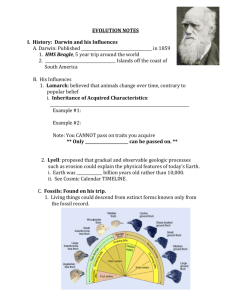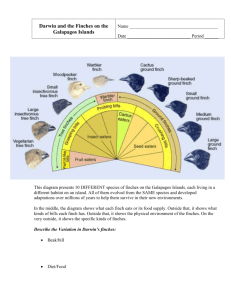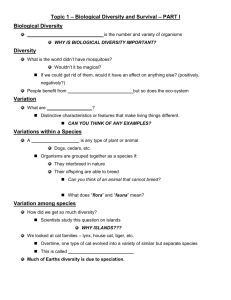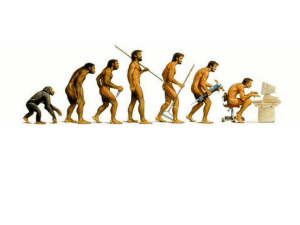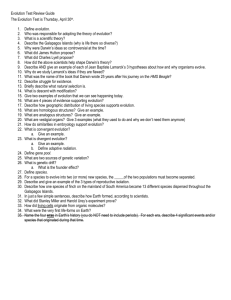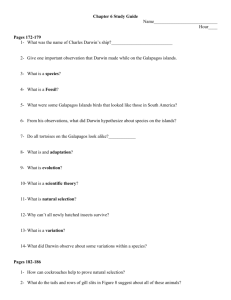Darwin Finches modified
advertisement
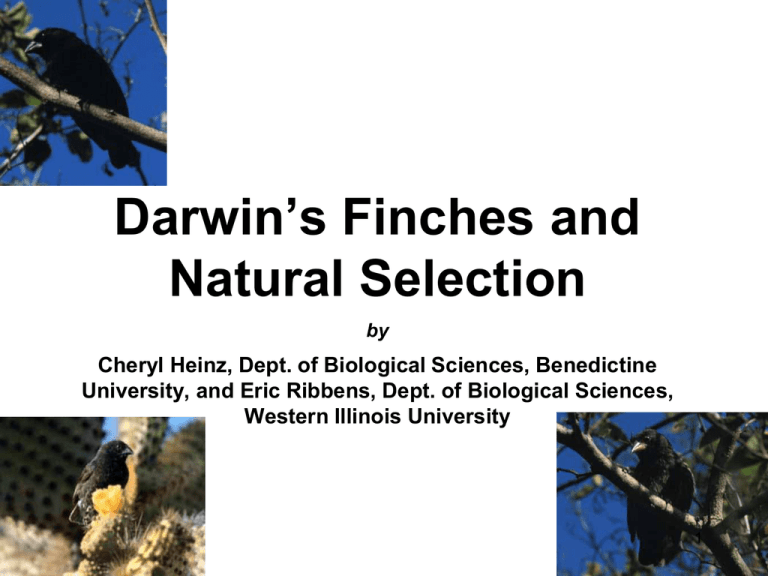
Darwin’s Finches and Natural Selection by Cheryl Heinz, Dept. of Biological Sciences, Benedictine University, and Eric Ribbens, Dept. of Biological Sciences, Western Illinois University 1 The Galapagos Islands • Located approximately 1000km from the coast of Ecuador, South America. • This is just a little closer than the distance between Chicago and Philadelphia. – Mostly ground between the two U.S. cities. – Mostly deep water between the Galapagos Islands and the coast of South America. 2 3 Implications • Terrestrial species on these islands won’t have many relatives nearby. • Neighboring islands will have close relatives – but new terrestrial species won’t arrive on these islands from the South American mainland very often. – most of the island species have had plenty of time to differentiate from their nearest living relatives. • Another way of saying this is that there is very little gene flow between the islands and the mainland. – Gene flow = animals of the same species but a different gene pool are introduced into a population 4 CQ1: Limited gene flow means: A: Birds rarely move between the mainland and the islands. B: Birds on the island have the same genes as birds on the mainland. C: Birds on the mainland don’t like birds from the islands. D: Birds on the mainland won’t evolve, but birds on the islands might. 5 Charles Darwin • Darwin explored these islands from April through October 1835. – Entire voyage of The Beagle: Dec 1831 - Oct 1836 • When and where he started thinking about what was to become his theory of evolution by natural selection. • He did not publish his thoughts until the publication of The Origin of Species in 1859. 6 Charles Darwin’s Ideas • Biological evolution is change in species over time. – This was not a new idea at the time – But there were no good mechanisms to explain how these changes occurred • Natural selection is just such a mechanism, and this is what Darwin contributed. 7 Galapagos Endemics • The Galapagos today is an amazing place. • Animals live there that are found nowhere else on earth. – This makes them endemic – Perhaps the most famous of the endemic birds are the finches, of which there are 13 different species • The islands are a natural laboratory, and one in which evolution can be observed. 8 Endemics Among the kinds of animals found here and nowhere else: – 1 penguin species – 1 giant tortoise species – 1 marine iguana species – 7 species of lava lizard – 14 species of sea cucumber – 1 species of sea lion – 1 species of hawk – several species each of mockingbirds, doves, owls, flycatchers, and yellow warblers 9 The Finches • The 13 finch species include: – – – – – – 6 species of ground finches 3 species of tree finches 1 woodpecker finch 1 vegetarian finch 1 mangrove finch 1 Coco Island finch • A warbler finch that looks more like a warbler than a finch (one of the tree finches). • The woodpecker finch actually uses cactus spines to dig grubs out of branches! 10 Evolution is: A change in the frequency of an allele, such as an allele for beak depth, is the basic definition of evolution. 11 Evolution by Natural Selection Steps: 1. Individuals vary in some traits. 2. Some of the differences in traits are passed along to offspring. – This requires a genetic basis to the trait – The trait is thus heritable (more…) 12 Evolution by Natural Selection 3. Different individuals produce different numbers of surviving offspring. – Produce different numbers, or – Different numbers survive. 4. The particular value of a trait is connected to the number of offspring produced. – Traits that allow for more offspring to be produced are said to be “naturally selected.” 13 Types of evolution • Microevolution – changes in the gene (allele) frequencies in a population over a short period of time • Macroevolution – changes in the gene (allele) frequencies in a population over a large amount of time that essentially differentiates a population from the rest of the species. 14 Evolution • Changes in the population are due to 4 main mechanisms: – Mutation – Natural selection – Gene flow – Genetic drift 15
